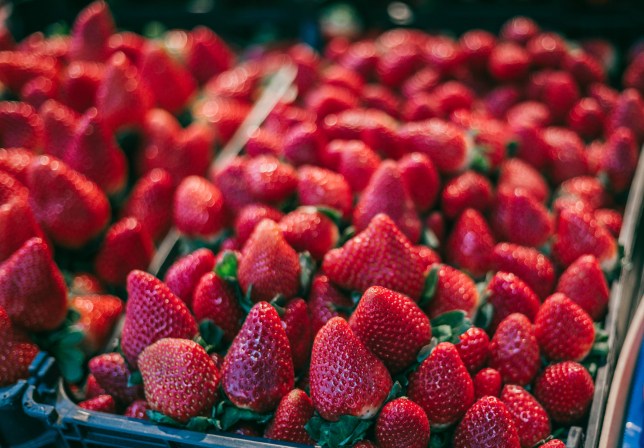Long-lasting toxins known as ‘forever chemicals’ have been found in common UK fruits, vegetables and spices, prompting health fears from campaigners.
PFA chemicals, used in some pesticides, were identified in a range of foods in 2022, according to results from the latest government testing.
Called ‘forever chemicals’, because they can take centuries to break down in the environment, PFAs can accumulate in the bodies of living organisms including humans. They have been linked to severe health conditions, including kidney and testicular cancer, an increase in cholesterol and high blood pressure in pregnant women.
More than 3,300 samples of food and drink available in the UK supply chain were tested for residues of around 401 pesticides in 2022, according to a report from the environment department’s advisory committee on pesticide residues (PRiF).
The Pesticide Action Network UK (Pan UK), which analysed the test results, found strawberries to be the worst offender, with 95% of 120 test samples containing PFA pesticides.
This was followed by 61% of the 109 grape samples tested, 56% of the 121 cherry samples, 42% of the 96 spinach samples and 38% of the 96 tomato samples.
Meanwhile, at least 15% of samples of peaches, cucumbers, apricots and beans contained PFAs, the analysis showed.
The PRiF report said that 56.4% of samples tested contained a residue of pesticides they were testing, but this was below the maximum residue level (MRL) allowed in food by law.
Meanwhile, 1.8% of the samples contained a pesticide residue above this legal level.
The report said the UK’s Health and Safety Executive (HSE) conducts a risk assessment of all pesticide residues found in the testing programme and takes further action if risks to health are identified.
‘It is useful to note, even when a food contains a residue above the MRL, HSE rarely finds any likely risk to the health of the people who have eaten the food,’ it said.
However, Pan UK said MRLs do not guarantee the quantity of pesticide found in the food is safe and do not take into account the many other routes of potential PFA exposure, such as plastic food packaging, drinking water and a wide range of household products.
Nick Mole, from Pan UK, said: ‘Given the growing body of evidence linking PFAs to serious diseases such as cancer, it is deeply worrying that UK consumers are being left with no choice but to ingest these chemicals, some of which may remain in their bodies long into the future.
‘We urgently need to develop a better understanding of the health risks associated with ingesting these “forever chemicals” and do everything we can to exclude them from the food chain.’
Pan UK is urging the government to ban the 25 PFA pesticides currently in use in Britain, six of which are classified as ‘highly hazardous’.
The organisation said ministers should also increase support for farmers to help them end their reliance on chemicals and adopt safer, more sustainable alternatives.
Mr Mole said: ‘The UK government’s much-delayed plans for limiting the negative impacts of PFAs focus solely on industrial chemicals, ignoring pesticides entirely.
‘PFA pesticides are absolutely unnecessary for growing food and are an easily avoidable source of PFA pollution.
‘Getting rid of them would be a massive win for consumers, farmers and the environment.’
Dr Shubhi Sharma, from Chem Trust, which campaigns to protect humans and animals from harmful chemicals, said: ‘PFAs are a group of entirely human-made chemicals that didn’t exist on the planet a century ago and have now contaminated every single corner.
‘No-one gave their consent to be exposed to these harmful chemicals, we haven’t had the choice to opt out, and now we have to live with this toxic legacy for decades to come.
‘The very least we can do is to stop adding to this toxic burden by banning the use of PFAs as a group’.
A Defra spokesperson said: ‘We set strict limits on the pesticides residue levels in both food for consumers and feed for animals. These limits are set to protect public health and are set below the level considered to be safe for people to eat as well as applying to both food produced in the UK and those imported from other countries.’
MORE : Pictures of the solar eclipse from across North America
MORE : Full list of the hospitals where you will be waiting the longest for a bed in A&E
MORE : An Italian volcano is behaving very strangely
Get your need-to-know
latest news, feel-good stories, analysis and more
This site is protected by reCAPTCHA and the Google Privacy Policy and Terms of Service apply.












